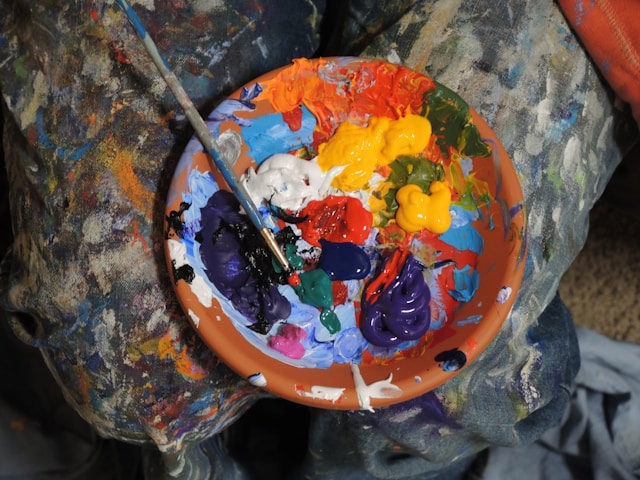One of my past clients is a painter, and he taught me something really important about learning what my own creative process is.
While working together one of the things he realized is that there was always a point somewhere in the middle of a project where he faced a creative challenge and didn’t know how he would solve it. Many paintings later, he realized that it’s just part of his process. He almost always faces a challenge, experiences doubt or doesn't like what he's producing and then boom! Somehow, the solution comes to him. Knowing this has helped him learn to trust that the idea will come. Now when he gets to that point in a painting, he walks away, trusting that he will find a solution instead of overworking the painting.
I was reminded of this when, in the last three months, I completed three large-ish mosaics. With every single one, I’d get to the middle and start to think, “Uh-oh. Is this working? I don’t think I like it.” That pattern is now somewhat predictable: If I’m stretching myself, I will likely come to an edge where I encounter self-doubt and experience fear.
It doesn’t mean anything is wrong or that I need to work on my self-esteem, go to therapy or practice affirmations.
It means that’s part of my creative process. At some point what I’m creating will look worse before it looks better. This goes for life, too. Rather than freak out about the fact that I’m experiencing self-doubt, I can accept that it’s part of the process.
I used to think that self-doubt meant I was doing something wrong. I believed that if I was on the right path, it meant I wouldn’t have to feel any self-doubt (or anything negative). I believed that if I was on the “right” path, I’d be confident ALL of the time. So when self-doubt arose, I worried it meant I was heading in the wrong direction, I’d made a bad decision or it was my “gut” predicting something bad was going to happen.
Now, I realize it’s pretty normal for me to feel self-doubt and fear anytime I navigate through something new that I care about. I may not like experiencing those things, but I can recognize them for what they are: my ego reacting to doing something new and fearing criticism.
I create more of my own misery by feeding the self-doubt with questions like, “What if this isn’t right? What if this means I’ve made a bad decision? What if this means I’m not supposed to do it this way?” This was torture until I recognized it was simply part of the process. I don’t have to believe the self-doubt or even try to argue with it. I can acknowledge that it exists.
At moments when I started to spin into self-doubt, it was critical that I step away from the project. Literally, leave the room and turn out the light. The best thing I could do was nothing related to the project. After time away, I could see what and how to fix what didn’t seem to be working.
In the past, I might have pushed through, continued working and re-working it until the whole thing was ruined and unsalvageable.
Stepping away is not giving up. Taking a break is not weak. Stepping away, rather than giving in to obsessive overwork, shows tremendous discipline. Those times I’ve worked at — more like worried at — something until it’s ruined have been motivated by my anxiety and my unwillingness to be disciplined about stepping away. Working more is not always the answer.
Let it sit; whatever “it” is, and trust that the answers will come.

